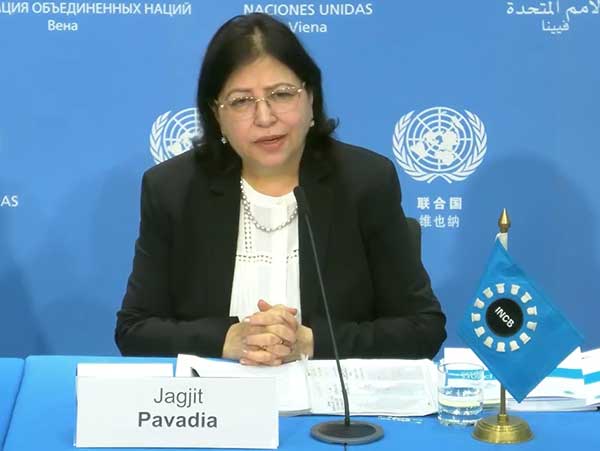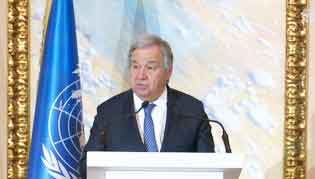India is taking proactive action to counter the illegal diversion of materials from its sprawling pharmaceutical industries and the use of an army of "underemployed" highly qualified chemists to make illegal synthetic drugs, according to the International Narcotics Control Board (INCB).
The annual report released by INCB President Jagjit Pavadia on Thursday said, "India, which is home to a large chemical and pharmaceutical industry, has witnessed the rise of commercial chemical factories that have been adapted to illicitly manufacture large quantities of synthetic drugs and their precursors".
"This development has been driven by the availability of highly qualified but underemployed chemists, who are susceptible to recruitment by criminal organisations," said the report from the Vienna-based organisation, which is a part of the UN.
"More proactive regulations are being developed and coordination among government agencies is being improved in order to facilitate the early detection and scheduling of new psychoactive substances," it said.
"In addition, the regulation of online drug sales is being improved, and both traditional and digital investigative capacities are being enhanced," the report added.
The observation about India was made amid a warning that the global demand for synthetic drugs "continues to grow" and "illicit manufacturing and trafficking organisations are expected to increase their global activities".
Unlike the drugs that are derived from plant materials, synthetic drugs like opioids, methamphetamine, Ecstasy (which is also known by its chemical initials MDMA) and ketamine are made from chemicals.
Pavadia said at a news conference that "the world precursor situation" involving the chemicals used to manufacture illicit synthetic drugs "has never been more complex and dynamic".
Ten new precursors for designer drugs with no known legitimate use have emerged and been placed under the purview of the international convention on drugs, she added.
The report said that according to India's Ministry of Social Justice and Empowerment, about 23 million people aged 10 to 75 have used drugs, mainly heroin and pharmaceutical opioids.
An estimated 8 million people were registered for opioid use disorders in India, it added.
The report said that there has been an alarming rise in the quantitiy of illicit drugs interdicted by authorities in India.
India seized 364 kg of cocaine in 2021 while in the previous three years, they averaged only about 40 kg, it said.
The report highlighted the long, treacherous tentacles of the drug trade: "The record level of seizures in 2021 was attributable to a single seizure involving 300 kg of cocaine discovered in a container that had originated in Panama and transited through Antwerp, Belgium, and Colombo."
The rise in the use of "darknet" - the secretive internet networks - and maritime routes has boosted trafficking.
As a result, seizures by India of heroin increased from 2,146 kg in 2017 to 7,282 kg in 2021, opium from 2,551 kg in 2017 to 4,386 kg in 2021, and cannabis from 352,539 kg in 2017 to 675,631 kg in 2021, the report said quoting government reports.
The report warned against the legalisation of cannabis - marijuana - that is taking place in several countries around the world.
Pavadia said, "Evidence suggests that cannabis legalisation has not been successful in dissuading young people from using cannabis, and illicit markets persist".
She expressed concern "about the expanding cannabis industry, which markets cannabis-based products in ways that appeal to young people, and about the playing down of harms associated with using high-potency cannabis products".






In setback to Pakistan, World Bank distances itself from Indus Water Treaty
In a major setback to Pakistan, the World Bank made it clear on Friday that it has no role to play in sorting out matters related to the Indus Water Treaty, which India has suspended following the terror attack in Pahalgam, which claimed the lives of 26 tourists.
Pakistan’s imported weaponry no match against India’s indigenous missile systems
India’s homegrown missile systems are proving to be a formidable deterrent to Pakistan’s imported military assets. As part of the Central government’s 'Atmanirbhar Bharat' initiative in the defence sector, Indian indigenous systems like the Akash missile have significantly bolstered the country’s military capabilities.
Can't even take name of PM Modi: Pak lawmaker calls Shehbaz Sharif 'coward'
The Pakistan government and its Army have found themselves at the receiving end of their citizens and Parliamentarians, after getting beaten in the war of nerves with their Indian counterpart and also losing face globally, over their brazen support to terror.
Pak propaganda alert: Sukhoi shot down, pilot captured; PIB says 2014 image of crash
The government on Friday trashed Pakistani social media handles claiming that a Sukhoi Su-30MKI was shot down in Muzaffarabad, and an Indian Pilot was captured.
India-Pak conflict affects 11 pc of daily domestic air traffic: Industry data
As tensions flare up between India and Pakistan, at least 11 per cent of the daily domestic air traffic has been affected following the shutdown of 24 airports in the country, data showed on Friday.
Defence Minister reviews 'Operation Sindoor', ongoing situation with military chiefs
Defence Minister Rajnath Singh on Friday held a high-level meeting at the Defence Ministry to review 'Operation Sindoor' and assess the current security situation along the border with Pakistan.
Defence Ministry advisory: Refrain from live coverage of operations, security forces' movement
The Ministry of Defence on Friday issued an advisory to the media to refrain from showing live coverage of defence operations and movement of security forces.
India is always a winner: CM Yogi lauds armed forces amid India-Pak tensions; calls for national unity
Uttar Pradesh Chief Minister, Yogi Adityanath, while addressing a gathering in Lucknow on the occasion of Maharana Pratap Jayanti on Friday, delivered a strong message of national unity amid escalating tensions between India and Pakistan.